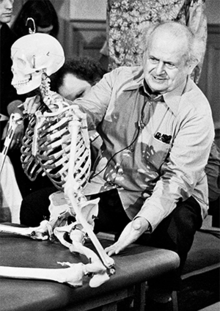I also practice this method alone at home. I have also read a number of books and listened to audio CDs on the subject.
Mrs. Toscano teaches at her lovely studio on 20th Avenue at 14810 NE 20th Ave., Vancouver, WA 98686. Phone: 360-798-5286. There is a small sign at the street titled: Feldenkrais Movement Center.
If your are driving north from Portland, on either I5 or I205, exit at 134th Street in north Vancouver, Washington. Vancouver is directly across the Columbia River from north Portland, and another suburb of the Portland Metropolitan Area. The Feldenkrais Movement Studio is a block north of the Kaiser Permanente Health Center, and three blocks north of the Legacy Hospital Complex. Highway 99 changes its name to NE 20th Ave at 134th Street.
This clean and comfortable practice space is very welcoming. The other older people are all pleasant and quiet. The teacher provides clean mats and support pads. Lots of windows look out on a large beautiful yard.
The Feldenkrais teachers I have listened to all talk you through a series of explorative gentle movements and techniques for drawing out attention/awareness implications. You self-observe, track, monitor, listen, feel, and experience yourself, non-judgementally, in a relaxed state, with a coach encouraging subtle insights.
I have read and studied many books and viewed and studied instructional CDs, VHS tapes, and UTube videos about Feldenkrais, Yoga, and Qigong.
Mrs. Toscano recommended we read Chapter 5 of the book by Norman Doidge, M.D., "The Brain's Way of Healing: Remarkable Discoveries and Recoveries from the Frontiers of Neuroplasticity," (Penguin Books, 2016). The chapter covers the life and work of Moshe Feldenkrais (1904-1984). He was a Ph.D. engineer, kudo master, movement therapist, author, and healer. The chapter discusses some of the core principles of his theory and methods as follows:
"1. The mind programs the functioning of the brain.
2. A brain cannot think without motor function.
3. Awareness of movement is the key to improving movement.
4. Differentiation: making the smallest possible sensory distinctions between movements - builds brain maps.
5. Differentiation is easiest to make when the stimulus is smallest.
6. Slowness of movement is the key to awareness, and awareness is the key to learning.
7. Reduce the effort whenever possible. Relax.
8. Errors are essential, and there is no right way to move, only better.
9. Random movements provide variation that leads to developmental breakthroughs.
10. Even the smallest movement in one part of the body involves the entire body.
11. Many movement problems, and the pain that goes with them, are caused by learned habit, not by abnormal structure."
Awareness Through Movement. Easy-To-Do Health Exercises to Improve Your Posture, Vision, Imagination and Personal Awareness. By Moshe Feldenkrais. HarperOne, Reprint edition, 2009. 192 pages. ISBN: 978-0062503220. VSCL.
Awareness Heals: The Feldenkrais Method for Dynamic Health. By Stephen Shafarman. Da Capo Lifelong Books, 1997. 224 pages. ISBN: 978-0201694697. VSCL.
The Brain's Way of Healing: Remarkable Discoveries and Recoveries from the Frontiers of Neuroplasticity. By Norman Doidge, M.D.. Penguin Books, 2016.
Change Your Age: Using Your Body and Brain to Feel Younger, Stronger, and More Fit. By Frank Wildman, Ph.D.. Da Capo Lifelong Books, 2010. 240 pages. ISBN: 978-0738213637. VSCL.
Embodied Wisdom: The Collected Papers of Moshe Feldenkrais. Edited by Elizabeth Beringer. Foreword by David Zemach-Bersin. North Atlantic Books, 1st Edition, 2010. 256 pages. ISBN: 978-1556439063. VSCL.


No comments:
Post a Comment